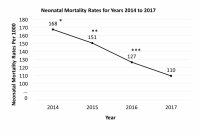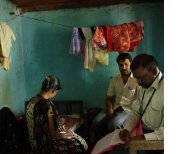Feedback/Comments from Our Readers
|
 Comments, questions and feedback is always welcome. Comments, questions and feedback is always welcome.
|
|
Social Justice Rounds - March 12, 2018
|
|
We're always looking for new speakers and ideas for topics for Global Health Rounds for the new coming up academic year in the Fall 2018. If you have speakers or topics, please contact Cheryl Knowles at GHFoMD@ualberta.ca. |
|
New Pilot Study Finds Low-Cost “Care Bundle” Associated with Significant Reduction in Preterm Infant Mortality in Tanzania
|
 A pilot study led by Jeffrey M. Perlman, MB, ChB involving 11 Tanzanian Physicians and Midwives found that new ways of approaching care in Tanzanian hospitals led to a significant reduction in preterm mortality.
The study, which has implications for most global resource-limited settings, was published today in PLOS ONE. Dr. Perlman, a professor of pediatrics at Weill Cornell Medicine and Chief of Newborn Medicine at NewYork-Presbyterian Komansky Children’s Hospital, and his research team explored ways to improve birth rates by providing midwifes and other members of the healthcare team with a low cost “care bundle.” The results are an overall 26% reduction in premature infant mortality and up to a 70% reduction in premature infant mortality when infants are exposed to all components of the care bundle.
Preterm infant mortality has remained high and unchanged for many years in Tanzania, a resource-limited country. Approximately 9500 premature babies die annually (equates to one death per hour). Major causes of death include birth asphyxia (suffocation), respiratory failure and infections. Tanzania has limited capacity to continuously monitor heart rates, breathing rates, and/or manage preterm infants with any breathing support other than oxygen. In addition, antibiotics are usually only given when preterm infants show any symptoms of distress, which is too late.
|
|
 Nobody wishes to endure pain, struggle to breathe, or watch their loved ones do so. Interventions exist to alleviate serious health-related suffering. Yet, most people who need these interventions do not receive them, especially the poor. The Lancet Commission on palliative care carefully details the current global situation in their October 2017 report Alleviating the access abyss in palliative care and pain relief.
Here I introduce selected points from the report, touch on the situation in the Pacific, and make suggestions for donor action.
What the report exposes is an abysmal global inequality. As the Commission puts it:
The fact that access to such an inexpensive, essential, and effective intervention [opiod [i] pain relief] is denied to most patients in low-income and middle-income countries (LMICs) and in particular to poor people… is a medical, public health, and moral failing and a travesty of justice.
A key concept in the Commission’s report is ‘serious health-related suffering’ (SHS):
Suffering is health-related when it is associated with illness or injury of any kind. Suffering is serious when it cannot be relieved without medical intervention and when it compromises physical, social, or emotional functioning. Palliative care should be focused on relieving the SHS that is associated with life-limiting or life-threatening health conditions or the end of life (p. 15).
To read more about this article go to http://www.devpolicy.org/
|
|
I Saw a Genocide in Slow Motion
|
 RAKHINE STATE, Myanmar — Sono Wara spent the day crying. And even after her tear ducts emptied, her shirt was still wet from leaking milk.
Her newborn twins had died the previous day, and she squatted in her grass-roof hut, shattered by pain and grief. She is 18 and this was her first pregnancy, but as a member of the Rohingya ethnic minority she could not get a doctor’s help. So after a difficult delivery, her twins lie buried in the ground.
Sometimes Myanmar uses guns and machetes for ethnic cleansing, and that’s how Sono Wara earlier lost her mother and sister. But it also kills more subtly and secretly by regularly denying medical care and blocking humanitarian aid to Rohingya, and that’s why her twins are gone.
Myanmar and its Nobel Peace Prize-winning leader, Aung San Suu Kyi, are trying to make the Rohingya’s lives unlivable, while keeping out witnesses. Some 700,000 Rohingya have fled to Bangladesh in recent months, but the fate of those left behind has been less clear, for Myanmar mostly bans foreigners from Rohingya areas. The government fired a warning flare when it arrested two Reuters journalists for reporting on an army massacre of Rohingya; the reporters face up to 14 years in prison for committing superb journalism.
To read more about this article go to https://www.nytimes.com
|
|
The Fight to Overturn El Salvador’s Abortion Law
|
In July 2017, 19-year-old Evelyn Beatriz Hernández Cruz was sentenced to 30 years in prison for a miscarriage. While she said that she had been raped and had not even known she was pregnant, Evelyn was the latest victim of El Salvador’s uniquely punitive abortion ban. Abortion law is so strict that even a miscarriage can be considered an intentional abortion—a crime that can result in decades in jail. More than 23 women are currently in prison in El Salvador for similar ‘abortion-related’ crimes.
El Salvador’s total ban on abortion has been condemned by the Inter-American Commission on Human Rights, Amnesty International, and the Center for Reproductive Rights. The UN High Commissioner for Human Rights, Zeid Ra’ad Al Hussein, said “I am appalled that, as a result of El Salvador’s absolute prohibition on abortion, women are being punished for apparent miscarriages and other obstetric emergencies.” The condemnation of global organizations is increasing external pressure on the Salvadoran government. But the real leg work is being done by local activists who are using advanced advocacy strategies to change both the laws and social norms from within the country.
To read more about this article go to https://www.publichealthpost.org
|
|
Philippines' Duterte Mocks Condom Use Amid Skyrocketing HIV Rates
|
 The number of new HIV cases reported in the Philippines has surged over the last few years, according the country's health agency. In 2007, fewer than 400 new cases were reported; in 2017, more than 11,000 new cases were identified.
The country had the fastest-growing HIV epidemic in the Asia-Pacific region, according to UNAIDS last year. At a time like this, the country's leader could encourage safer sex, to prevent further sexually transmitted infections.
Or he could do what Filipino President Rodrigo Duterte did last week — and urge his citizens to forgo condoms during intercourse because "they don't feel good."
The subject arose during a characteristically bizarre digression in a speech to Filipino workers back just from Kuwait. Hundreds of Filipino workers in Kuwait have accepted the Philippines' offer of a free flight home after a Filipino woman's body was found in a freezer of her employer's home in the Gulf state.
|
|
|
|
Save the Dates of Local Events!
|
Social Justice Rounds
Guest Speaker:
Dr. Ayelet Kuper From the University of Toronto
March 12, 2018
12:00 - 1:00
Room: 1-190 ECHA
============================
REMINDER ONLY
Social Justice Workshop
Facilitated by: Dr. Ayelet Kuper, University of Toronto
March 13, 2018
Time: 15:00 - 18:00
Location: 4-036 ECHA
===========================
Annual Rich Man Poor Man Dinner Event 2018
April 7, 2018
Time: 6:00 pm to 9:30 pm
Please note if you have any resaleable items for the SIHA silent auction, please email me at GHFoMD@ualberta.ca. Thanks for those who donate. |
|
Conferences, Symposiums & Lectures
|
Save this link to your favorites as I update it daily will all events, symposiums, etc., just click here.
==========================
2018 CUGH Conference
March 16 - 18, 2018
New York Hilton Midtown,
=========================
Global Health & Innovation Conference
April 14-15, 2018
Yale University
New Haven, CT
|
|
Call for Abstracts/Submissions
|
Global Health & Innovation Conference at Yale on
April 14-15, 2018
is calling for abstracts.
|
|
Newsletter & Special Journal Editions
|
|
|